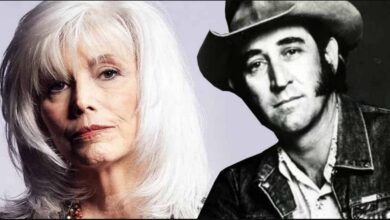Unable To Form Sentences, Sang Oh, My. 46 Years Later, It Still Echoes
Elvis Presley, an iconic figure in the world of music, emerged from humble beginnings to revolutionize the soundscape of the 20th century. Born on January 8, 1935, in Tupelo, Mississippi, he would go on to become a pivotal figure in the evolution of rock ‘n’ roll. His unique blend of musical influences, including gospel, blues, and country, created a distinct sound that captivated audiences and shattered societal norms. He was a cultural innovator, blending different genres in a way that appealed to a wide demographic, which played a significant role in bridging racial divides in a segregated America.
From his first recordings at Sun Studio in Memphis in 1954, it was evident that Elvis was a force to be reckoned with. His early hits like “Heartbreak Hotel,” “Hound Dog,” and “Don’t Be Cruel” showcased his vocal prowess and charismatic stage presence. Fans were drawn not only to his voice but also to his electrifying performances characterized by his signature gyrating hips, which ignited a frenzy among audiences. Elvis became a household name, earning the titles of the “King of Rock ‘n’ Roll” and a pop culture phenomenon.
Over the years, Presley’s career transcended music; he also made significant inroads into film. With a string of successful movies, including “Jailhouse Rock,” “Blue Hawaii,” and “Viva Las Vegas,” he demonstrated his versatility as a performer. His films often featured original songs that became chart-topping hits, further solidifying his status in the entertainment industry. Despite mixed reviews from critics, fans adored his silver screen presence, and the films contributed to his mass appeal and fan base expansion.
However, as the years progressed, the pressures of fame and the entertainment industry took a toll on Presley’s personal life. His marriage to Priscilla Presley ended in divorce in 1973, an event that deeply affected him emotionally. Despite his success, the personal struggles he faced were at odds with his public persona, reflecting the complexities of life as a superstar. Fans often saw glimpses of this vulnerability in his later performances, where the emotional weight of his experiences seeped into his music.
In the months leading up to his death, Elvis faced significant health challenges. His battles with prescription medication and substance abuse worsened, ultimately leading to a decline in his physical condition. The final public appearances captured the heartbreaking reality of a once vibrant performer now struggling to maintain the energy and charisma that defined his earlier years. These performances, particularly the last show in Indianapolis, included powerful moments that highlighted his enduring talent juxtaposed against his faltering state.
During his final concert series, particularly during “Elvis in Concert,” he displayed a commitment to his craft despite the evident difficulties he encountered. His performance of “Are You Lonesome Tonight?” remains one of the most poignant moments in his legacy. His heartfelt connection with the audience, even amid personal turmoil, demonstrated his ability to convey raw emotion through his music. The crowd’s reaction to his each note reflected the profound link between Elvis and his listeners, an unbreakable bond that transcended time.
The public’s response to his final performances was mixed. While many celebrated the talent on display, others expressed concern over his health. Critics pointed out the stark contrast between his previous vigor and the struggles he faced on stage, coining phrases like “Fat Elvis” to describe this period. This depiction overshadowed the artistry he produced during these last performances, often failing to recognize that his vocal ability remained sharp and emotive. Elvis’s ability to convey deep feelings through his music, even during a time of personal crisis, is a testament to his artistry.
Jerry Schilling, a close friend, recalled the internal struggles surrounding the decision to film “Elvis in Concert.” Despite concerns from those around him, including friends and family, Elvis’s determination to connect with his fans was unwavering. It was a reflection of his dedication to his art form, highlighting his desire to perform and share his music, even as his health declined.
After his untimely death on August 16, 1977, there was an outpouring of grief from fans worldwide. Elvis’s influence continued to grow posthumously, inspiring countless artists across diverse genres. The music landscape evolved, but his imprint remained undeniable. Tributes poured in from fellow musicians, actors, and fans who celebrated his contributions to music and culture. His life and career have become the subject of numerous documentaries, books, and films, ensuring that his story endures.
Elvis Presley’s legacy is not solely one of his musical genius but also one of a man who faced challenges with an unwavering commitment to his art. His music continues to resonate, offering a glimpse into the life of a complicated and groundbreaking artist. He remains a symbol of the transformative power of music in shaping culture, forging connections, and inspiring future generations of musicians. Even decades after his passing, Elvis’s voice continues to echo, reminding us of the profound impact one individual can have on the world.
&ab_channel=rosikalau





